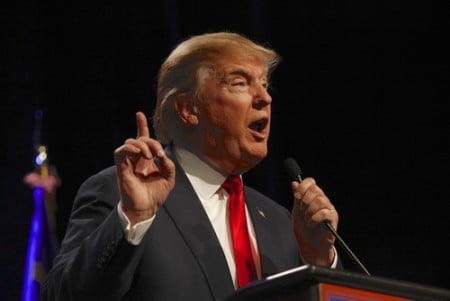Mueller considering possible obstruction of justice case against Trump, report says

President Donald Trump/Shutterstock
Special Counsel Robert Mueller will be interviewing three leading intelligence officials soon, with indications that he is scrutinizing possible obstruction of justice by President Donald Trump, the Washington Post reported Wednesday.
Mueller’s office has reached out to Director of National Intelligence Daniel Coats, National Security Agency Director Adm. Mike Rogers and recently retired deputy NSA director Richard Ledgett. Earlier this week, news reports indicated that Trump was thinking about firing Mueller but was dissuaded by staff.
Mueller is taking up an obstruction of justice probe of Trump that began at the FBI soon after Comey was fired on May 9, anonymous sources told the Post.
In congressional testimony last week, Comey said Trump had told him he hoped the FBI could let go of the investigation of former national security adviser Michael Flynn. Comey said he understood the president to be requesting that the FBI drop any investigation into alleged false statements Flynn made about his conversations with Russians.
According to the Post’s sources, Trump spoke to Coats and Rogers about the Russia investigation the next month. In a March 22 meeting, Trump reportedly asked whether Coats could ask Comey to back off the FBI’s focus on Flynn. Coats has said he didn’t feel pressured to do so, however.
A day or two later, Trump reportedly asked Coats and Rogers to publicly state there was no evidence of coordination between his campaign and the Russian government. The two officials did not agree to the request.
Ledgett wrote an internal memo about Trump’s phone call to Rogers, officials told the Post.
Trump took to Twitter Thursday morning to slam the report.
They made up a phony collusion with the Russians story, found zero proof, so now they go for obstruction of justice on the phony story. Nice
— Donald J. Trump (@realDonaldTrump) June 15, 2017
You are witnessing the single greatest WITCH HUNT in American political history - led by some very bad and conflicted people! #MAGA
— Donald J. Trump (@realDonaldTrump) June 15, 2017
The White House could assert executive privilege to prevent those officials from being questioned about conversations with the president, which could lead to battles in court, where judges have tended to hold that criminal investigations can override such privilege, the New York Times reports.
Debra Cassens Weiss contributed to this article.
Updated at 1:55 p.m. to include more information from the Post article. Updated at 2:12 p.m. to add contributing tagline.
Write a letter to the editor, share a story tip or update, or report an error.


